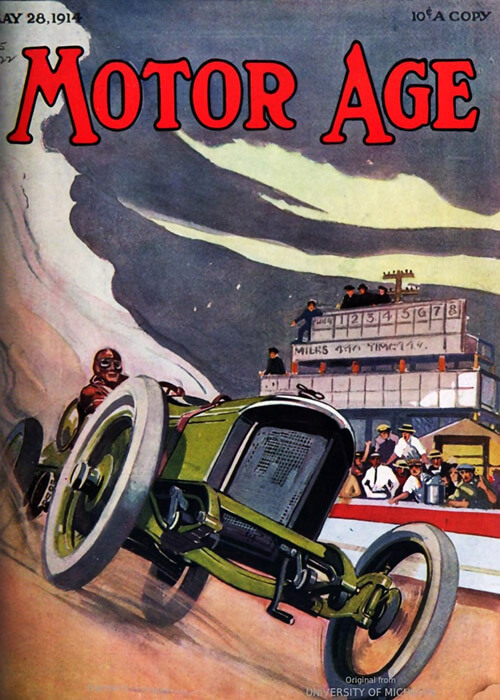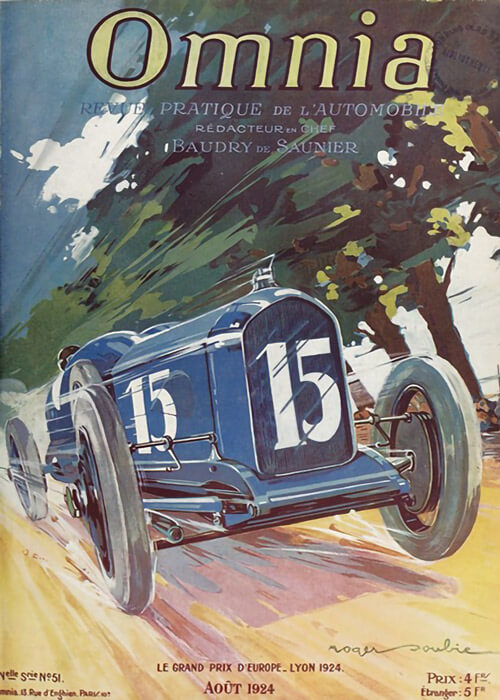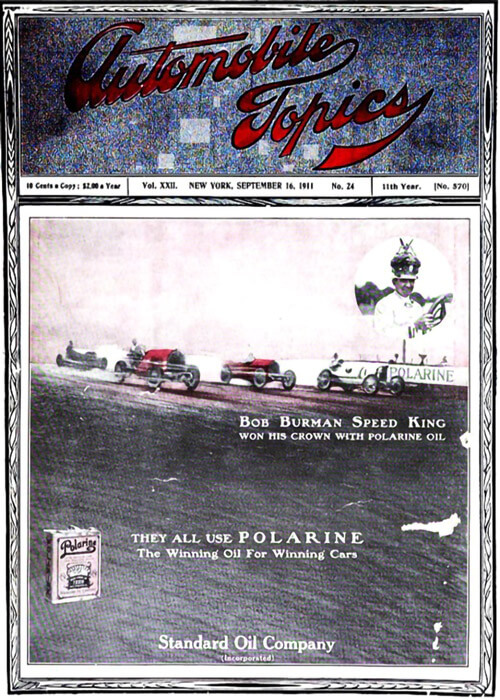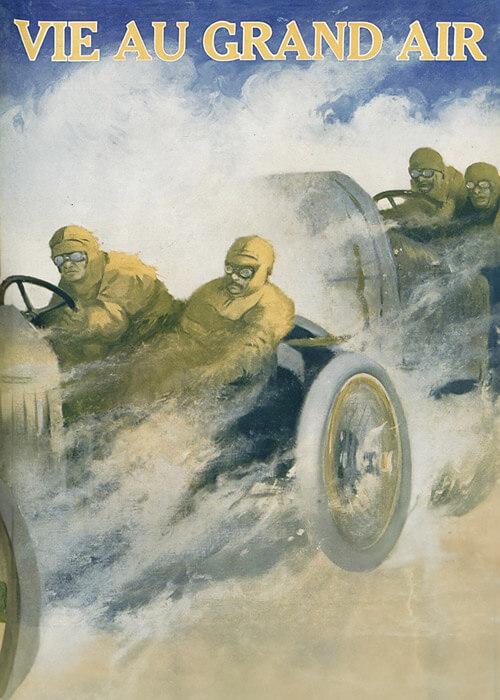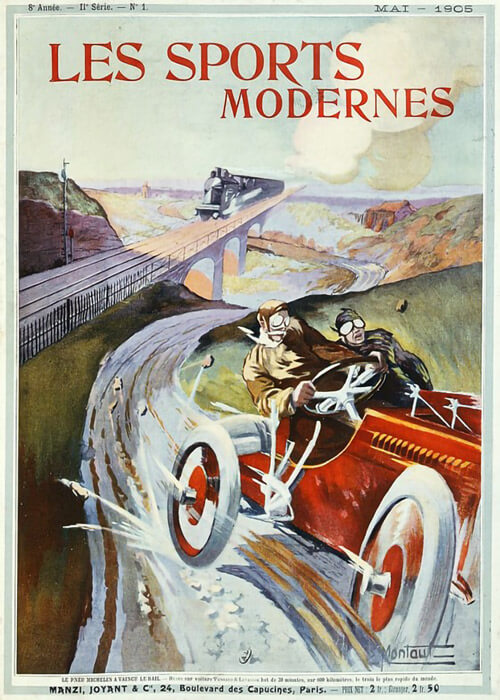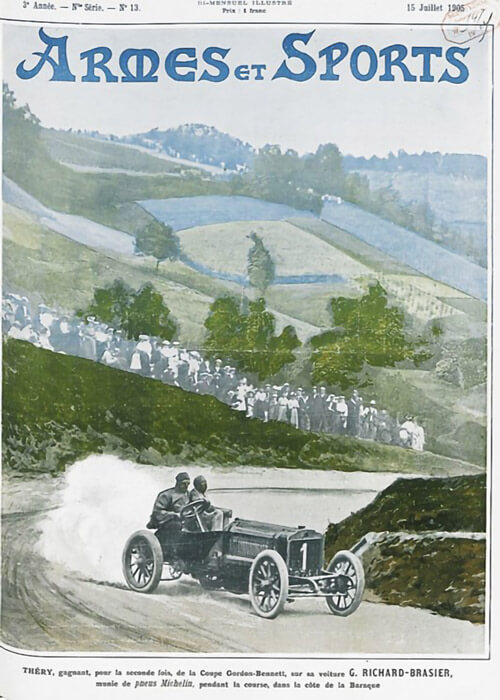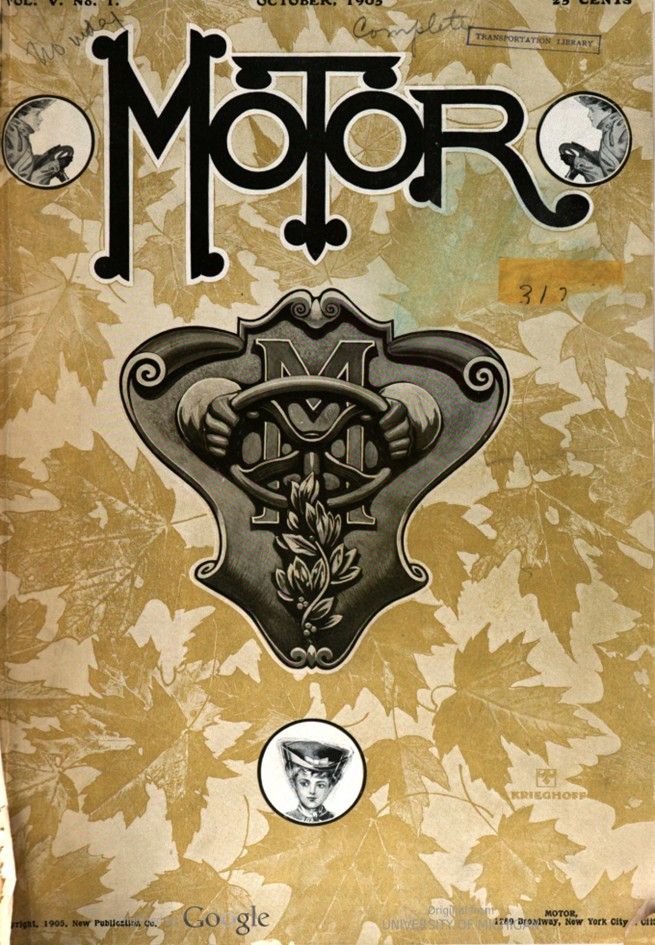
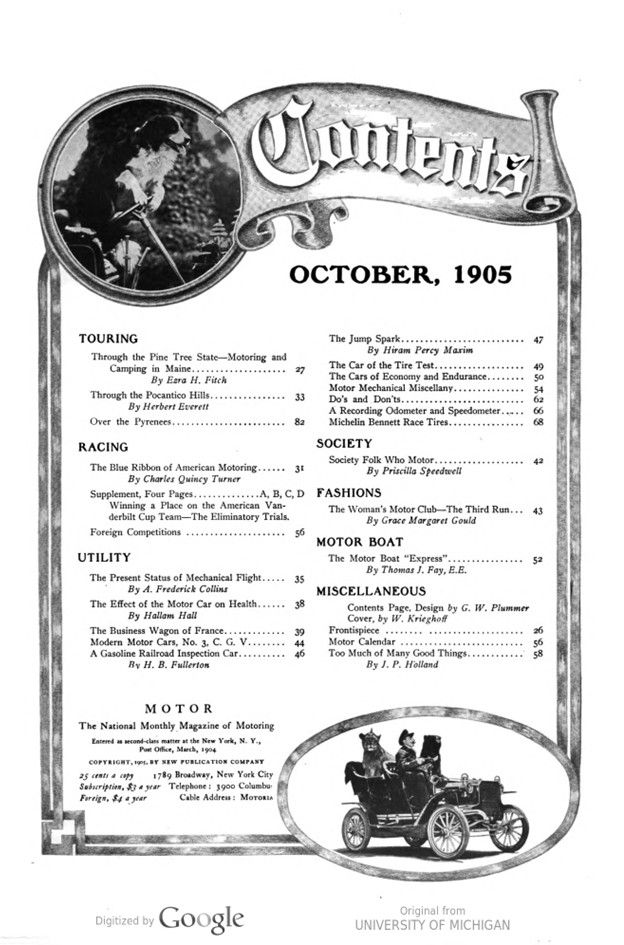
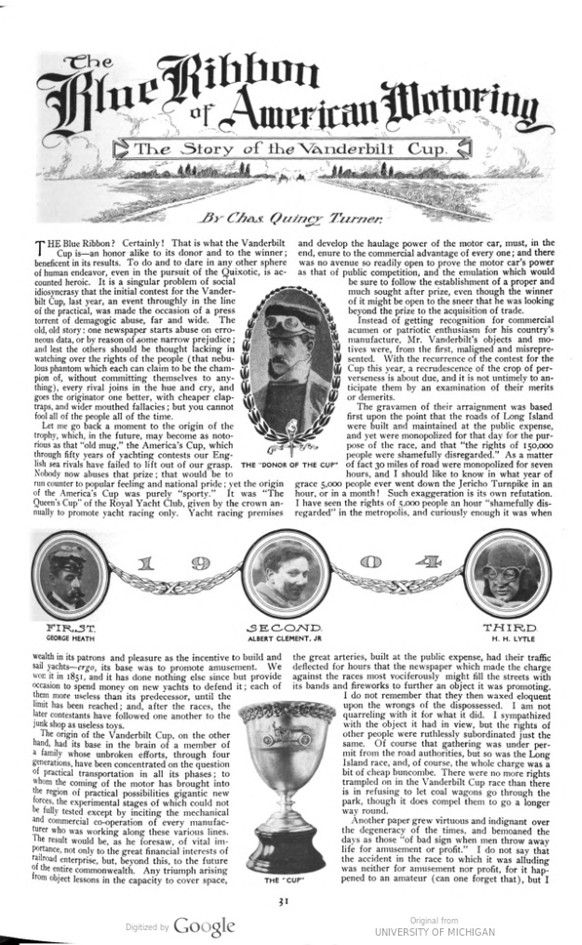

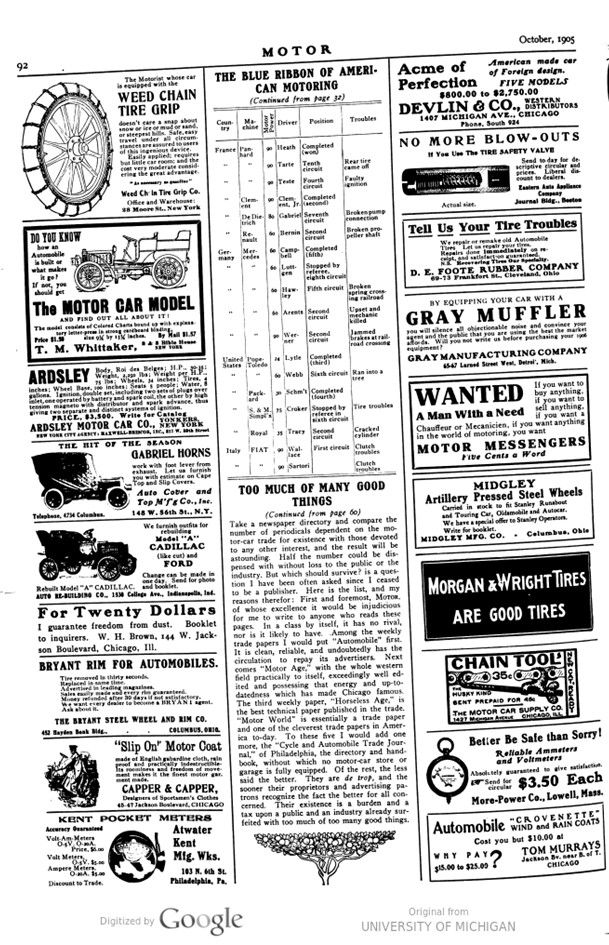
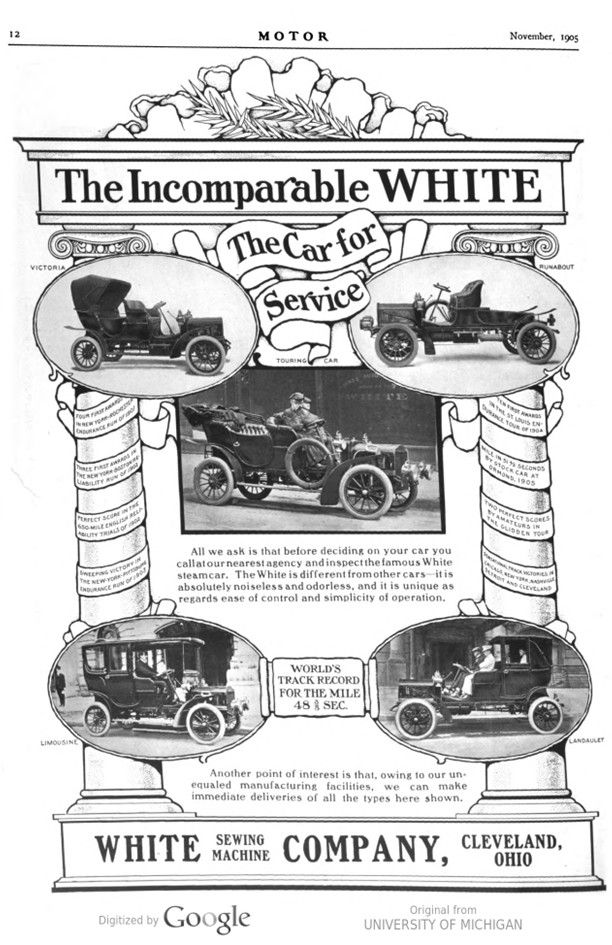
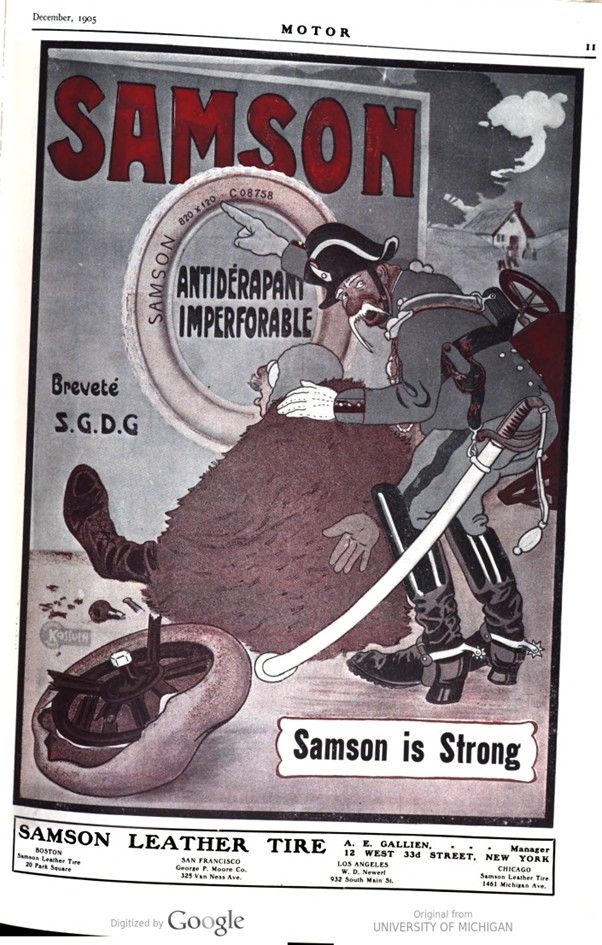
Text and pictures with courtesy of Hathitrust.org; compiled by motorracinghistory
MOTOR, Supplement A,B,C,D – October 1905 – Page 24-26
The Blue Ribbon of American Motoring – The Story of the Vanderbilt Cup.
By Chas. Quincy Turner.
THE Blue Ribbon? Certainly! That is what the Vanderbilt Cup is – an honor alike to its donor and to the winner; beneficent in its results. To do and to dare in any other sphere of human endeavor, even in the pursuit of the Quixotic, is accounted heroic. It is a singular problem of social idiosyncrasy that the initial contest for the Vanderbilt Cup, last year, an event thoroughly in the line of the practical, was made the occasion of a press torrent of demagogic abuse, far and wide. The old, old story: one newspaper starts abuse on erroneous data, or by reason of some narrow prejudice; and lest the others should be thought lacking in watching over the rights of the people (that nebulous phantom which each can claim to be the champion of, without committing themselves to anything), every rival joins in the hue and cry, and goes the originator one better, with cheaper clap-traps, and wider mouthed fallacies; but you cannot fool all of the people all of the time.
Let me go back a moment to the origin of the trophy, which, in the future, may become as notorious as that „old mug,“ the America’s Cup, which through fifty years of yachting contests our English sea rivals have failed to lift out of our grasp. Nobody now abuses that prize; that would be to run counter to popular feeling and national pride; yet the origin of the America’s Cup was purely „sporty.“ It was „The Queen’s Cup“ of the Royal Yacht Club, given by the crown annually to promote yacht racing only. Yacht racing premises wealth in its patrons and pleasure as the incentive to build and sail yachts – ergo, its base was to promote amusement. We won it in 1851, and it has done nothing else since but provide occasion to spend money on new yachts to defend it; each of them more useless than its predecessor, until the limit has been reached; and, after the races, the later contestants have followed one another to the junk shop as useless toys.
The origin of the Vanderbilt Cup, on the other hand, had its base in the brain of a member of a family whose unbroken efforts, through four generations, have been concentrated on the question of practical transportation in all its phases; to whom the coming of the motor has brought into the region of practical possibilities gigantic new forces, the experimental stages of which could not be fully tested except by inciting the mechanical and commercial co-operation of every manufacturer who was working along these various lines. The result would be, as he foresaw, of vital importance, not only to the great financial interests of railroad enterprise, but, beyond this, to the future of the entire commonwealth. Any triumph arising from object lessons in the capacity to cover space, and develop the haulage power of the motor car, must, in the end, ensure to the commercial advantage of every one; and there was no avenue so readily open to prove the motor car’s power as that of public competition, and the emulation which would be sure to follow the establishment of a proper and much sought after prize, even though the winner of it might be open to the sneer that he was looking beyond the prize to the acquisition of trade.
Instead of getting recognition for commercial acumen or patriotic enthusiasm for his country’s manufacture, Mr. Vanderbilt’s objects and motives were, from the first, maligned and misrepresented. With the recurrence of the contest for the Cup this year, a recrudescence of the crop of perverseness is about due, and it is not untimely to anticipate them by an examination of their merits. or demerits.
The gravamen of their arraignment was based first upon the point that the roads of Long Island were built and maintained at the public expense and yet were monopolized for that day for the purpose of the race, and that „the rights of 150,000 people were shamefully disregarded.“ As a matter of fact, 30 miles of road were monopolized for seven hours, and I should like to know in what year of grace 5,000 people ever went down the Jericho Turnpike in an hour, or in a month! Such exaggeration is its own refutation. I have seen the rights of 5,000 people an hour „shamefully dis- regarded“ in the metropolis, and curiously enough it was when the great arteries, built at the public expense, had their traffic deflected for hours that the newspaper which made the charge against the races most vociferously might fill the streets with its bands and fireworks to further an object it was promoting. I do not remember that they then waxed eloquent upon the wrongs of the dispossessed. I am not quarreling with it for what it did. I sympathized with the object it had in view, but the rights of other people were ruthlessly subordinated just the same. Of course, that gathering was under permit from the road authorities, but so was the Long Island race, and, of course, the whole charge was a bit of cheap buncombe. There were no more rights trampled on in the Vanderbilt Cup race than there is in refusing to let coal wagons go through the park, though it does compel them to go a longer way round.
Another paper grew virtuous and indignant over the degeneracy of the times and bemoaned the days as those „of bad sign when men throw away life for amusement or profit.“ I do not say that the accident in the race to which it was alluding was neither for amusement nor profit, for it happened to an amateur (can one forget that), but I do say that, in order to make a profit out of the description of the scenes of carnage and war, no newspaper will hesitate to send its correspondents into the firing line of a battle, or into the pestilential zone of the military hospitals, so long as „copy“ can be had.
Yet another paper waxed indignant at „hundreds of thousands of dollars being thrown to the wind.“ What wind? Not a cent of it but went back into trade sources in wages, in promoting inventions, which in the end will revolutionize social conditions, and work untold blessings on millions yet unborn.
Suppose the accident even did happen, which I do not admit, when the victim of it was „in search of amusement,“ what of that? Are we all to lie in bed between down covers, in order that we may not be injured when in pursuit of otherwise innocent recreation? It’s against the fundamental laws of human nature, and no amount of press abuse or advice will ever alter it. We all take „dares“ from our early boyhood up and run risks in doing so; it is part of the inborn instinct of all healthy youngsters; and it will be a namby-pamby nation whose youths refuse to do it. Motoring is not nearly so risky as lots of other amusements for which nobody is re- proved. Does not the climbing of the Alps and other mountains claim yearly its toll of victims? Is walking therefore wicked? I suppose if it resulted in accident it would come under the castigation of certain of the press whose lash was out for the „idle rich“ motorist. Shall we cease to ride horse-back because sometimes a horse will get its foot in a gopher hole and in stumbling the rider’s ribs are broken? Shall we abandon yachting because the ignorant and unskilled sometimes pay the penalty of rashness? Shall we flay the motorist as a social leper „cutting a swath of death to make a gentleman’s holiday,“ or for „throwing away life for profit,“ and load with honors, as heroes, the men who, in spite of all past experience, year after year lure crews to certain death in the Arctic region, in order that the leaders may write books for much money, if they return from their futile and useless quest for the North Pole?
But let us leave the vituperators to their baseless calumnies and feeble logic. Time will take its revenge, and the Vanderbilt Cup will justify itself as the Blue Ribbon of American motoring. Should it never be raced for again, it still would be the Blue Ribbon. It made a good start last year, when it brought to the fore the fact that the product of America in motor cars, low powered, practicable, were to be depended upon, for of all the heavy, high motor power cars which started, only two survived to the finish. There was honor enough for the first round in the fight, and a most valuable commercial indicator. It was what the donor of the cup intended to induce, the handwriting on the wall, pointing out the direction of future efforts, and the lines along which, ultimately, a mighty fabric of manufacturing will be based; to the profit of hundreds of thousands engaged in the multifarious ramifications into which the trade runs, and to the ultimate evolution of lines of motor traffic which carry untold blessings into every corner of the land.
This year’s racing will be far more valuable in its lessons than last year’s, because it will enable comparisons to be made. The course will be located in the same district, modified as regards controls in favor of this year. What improvements, therefore, may result will be mainly due to better machines, more intimate knowledge of mechanisms, simplicity in design, strengthening of parts, and increased resistance in tires. For the purpose of making these comparisons, an epitome on page 92 of the points of failure in the machines of 1904, and the proportions of the ten circuits which each machine covered, and when and why some of them were put out, will be found useful.
If the Vanderbilt contest and its successors, in addition to the unquestioned value as tests and as yearly marking-stones on the road to the goal of perfection, also give pleasure to those who delight to see an exhibition of endurance, nerve, pluck and skill, even in the manipulation of machinery, shall they forego it because there be those to whom it gives no corresponding emotion? I may propound for all such narrow-minded, envy-eaten critics, what Falstaff did for the propounders for him of a code of conduct with which he had no sympathy, „Shalt there be no more cakes and ale because thou art virtuous?“ I throw the cakes and ale of motoring will last as long as human nature remains what it has been, in every nation which has been worthy of a place in the annals of the world.
In order that a team of five cars might be selected to represent America in the Vanderbilt Cup contest, eliminatory trials were held on Saturday, September 23rd, over the same course as the main event will be run. The distance for the eliminatory race was 113 1/3 miles, or four circuits of the 12 course, which is 28 1/3 miles around. The drivers and numbers of the twelve cars who drew for position were as follows: 1-Frank Nutt, driving a 50 m.p. Haynes, entered by Edward Haynes; 2-Bert Dingley, driving a 60 m.p. Pope-Toledo, entered by A. L. Pope; 3-Ralph Mongini, driving a 40 m.p. Matheson, entered by L. M. Palmer, Jr.; 4-Walter White, driving a 40 m.p. White, entered by R. H. White; 5-Joseph Tracy, driving a 120 m.p. Locomobile, entered by Dr. H. E. Thomas; 6Geo. Robertson, driving a 60m.p. Christie, entered by James L. Breese; 7-Robert Jardine, driving a 40 m.p. Royal Tourist, entered by E. D. Shurman; 8-Mortimer Roberts, driving a 60 m.p. Thomas, entered by H. S. Houpt; 9-W. F. Winchester, driving a 60 m.p. Franklin, entered by Col. E. H. R. Green; 10-Tom Cooper, driving a 40 m.p. Matheson, entered by C. W. Matheson; II-Carl Fisher, driving a 60 m.p. Premier, entered by T. A. Weidley; 12-H. H. Lytle, driving a 90 m.p. Pope-Toledo, entered by A. A. Pope. (Continued on page 92)
With this issue of MOTOR is a four-page supplement which contains the results of the American eliminatory trials for the Vanderbilt Cup team, and which is to supplement the article above, „The Blue Ribbon of American Motoring.“ –
Photo captions.
Page 31.
THE „DONOR OF THE CUP“
FIRST. GEORGE HEATH SECOND. ALBERT CLEMENT, JR THIRD. H. H. LYTLE
THE „CUP“
Page 32.
GEORGE HEATH, IN THE WINNING PANHARD LAST YEAR
ALBERT CLEMENT JR., IN THE CLEMENT-BAYARD-SECOND
H. H. LYTLE WHO WON THIRD PLACE IN A STOCK POPE-TOLEDO
